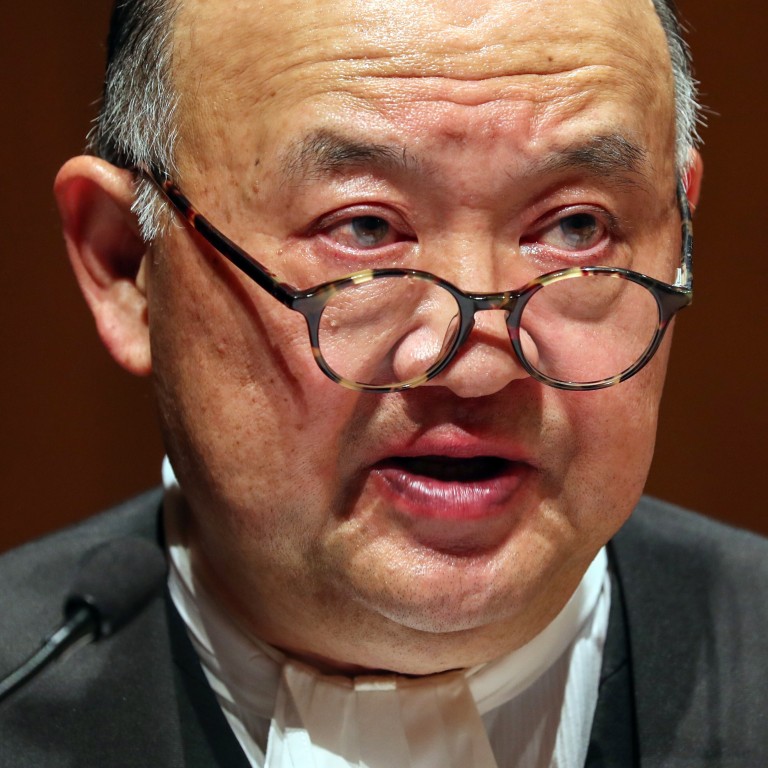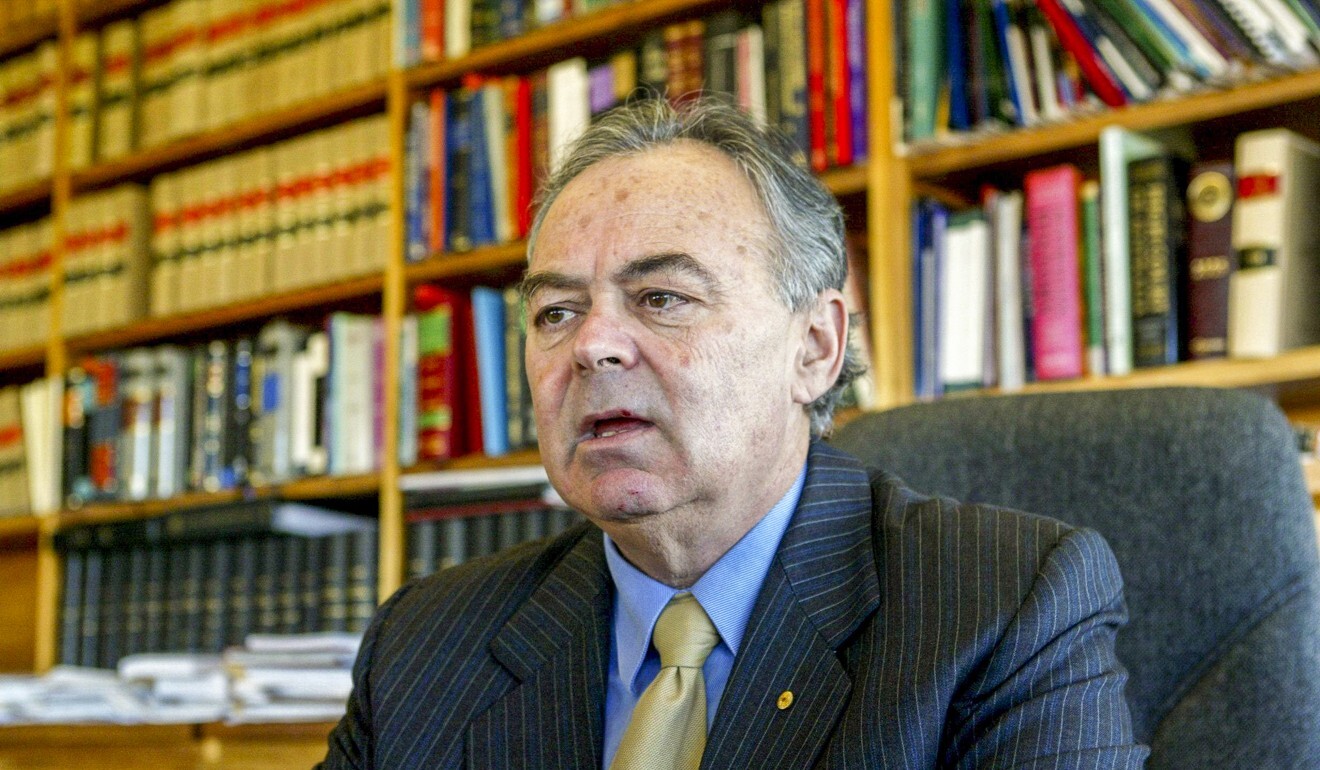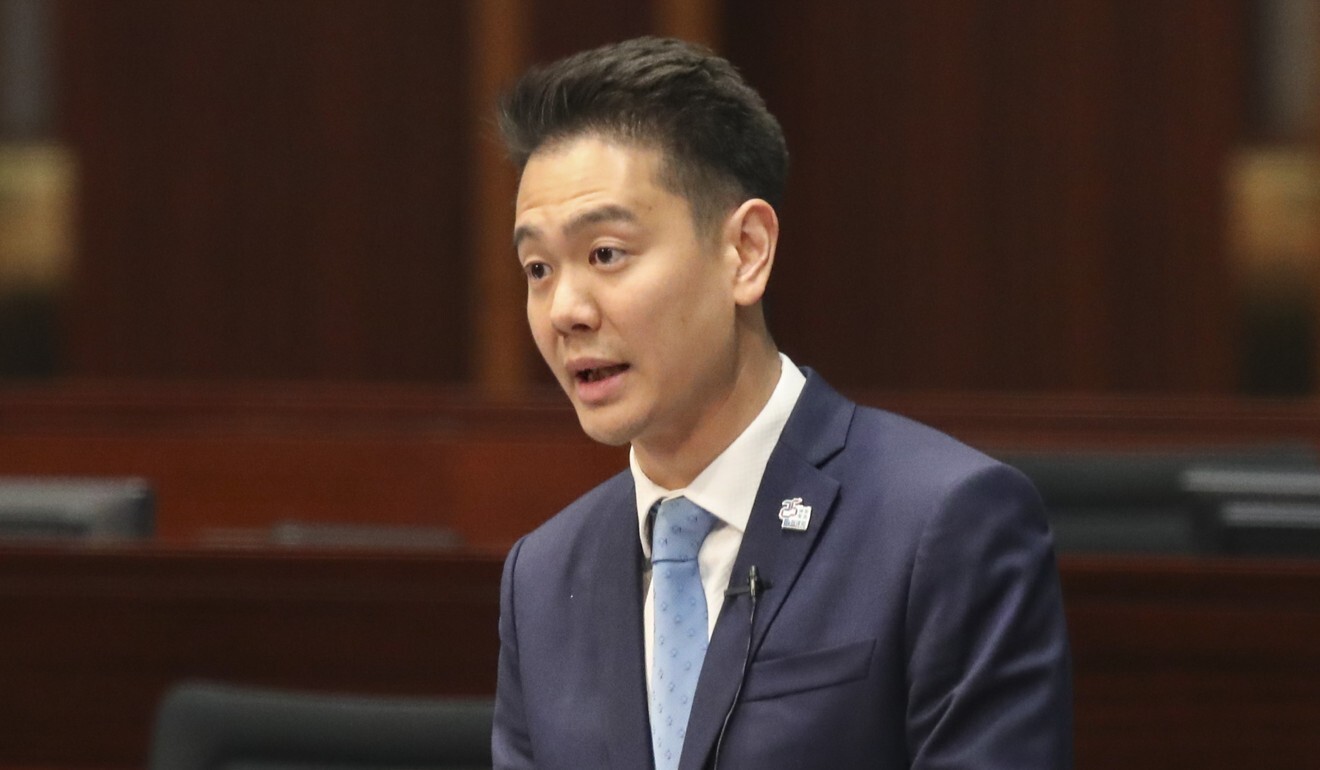
Hong Kong’s chief justice warns against politicising courts and says judges must be above bias
- Geoffrey Ma stresses cases must be handled strictly in accordance with the law and legal principles
- His 18-page statement comes as the judiciary faces immense pressure from complaints, the new security law and fears over judicial independence
Hong Kong’s chief justice has warned against politicising the judiciary in a lengthy plea on Wednesday, advising that any criticism of the courts and judges without proper grounds would be detrimental to public confidence in the system.
Geoffrey Ma Tao-li’s 18-page statement, his second in just under three months, was issued in the wake of recent controversies over the impartiality of judges in protest-related hearings as they were condemned by both government critics and supporters.
The statement by the chief justice, who ends his term in January, sought to lay down the fundamental principles regarding the administration of justice in Hong Kong, with an emphasis on criminal cases.

“It is important to bear in mind that the exercise of judicial power requires judges to determine and handle cases strictly in accordance with the law and legal principles. The responsibility of our courts is to determine legal disputes according to the law,” Ma said.
“It is no part of the courts’ function to determine, for example, political controversies, to promote any political viewpoint, or to adjudicate in accordance with any mainstream media or public opinions. “Courts and judges do not have the power to do this. Neither should they seek to do this. It follows from this that clearly, judges must not be influenced by political considerations of whatever nature in the discharge of their duty to apply the law.”
Ma pointed to recent suggestions by some observers for Hong Kong to adopt a ‘sentencing committee’, as some other common law jurisdictions have done, which would set binding punishment standards for all criminal cases.
Are the courts becoming politicised and are judgments biased?
“The judiciary emphasises that sentencing is a judicial function to be exercised by the courts independently and exclusively,” he said. “The courts make sentencing decisions day in and day out in a very large number of different cases. Deciding on a just and appropriate sentence in each case is a challenging and difficult task for the courts and is a matter for balanced judicial judgment.”
Levelling serious accusations of bias or a breach of fundamental principles simply because a ruling went against one’s liking was wrong, the chief justice stated.
The judiciary is not above criticism by any means but any criticism must be solidly based
“It is wrong and detrimental to public confidence in the administration of justice to level criticisms against judges and the courts without being informed, and without proper grounds and reasons, or to base such criticisms on bare assertions or matters taken out of their proper context,” he said.
The chief justice acknowledged that if the courts breached fundamental principles, criticisms could be justifiably made.
“The judiciary is not above criticism by any means but any criticism must be solidly based and properly made. In particular, there must not be a politicisation of the judiciary and its functions,” Ma said.
The courts have come under intense scrutiny in recent months, with both the opposition and pro-establishment camps attacking multiple rulings. The judiciary on September 8 moved to defend its decision to reassign Magistrate Stanley Ho Chun-yiu to an administrative role after he criticised two police officers for lying as he acquitted Eastern district councillor Jocelyn Chau Hui-yan of assaulting a member of the force during a protest last year.
The pro-establishment bloc slammed the reshuffle as rewarding bias with a pay rise, while opposition activists said Ho was being sidelined simply because his rulings favoured their camp.
That came after another controversial move by the judiciary in May, when Ma asked District Judge Kwok Wai-kin to refrain from airing his views on controversial issues during trials. Kwok had expressed sympathy for a defendant who attacked three people at a “Lennon Wall” where anti-government messages were posted. The judge described the offender as “an involuntary sacrifice and a bloodstained victim”.
Ma said that, for now, Kwok should not deal with any cases with a similar political context.
Amid such a highly charged atmosphere, divisive rulings have been met with a flurry of complaints. After Fanling Principal Magistrate Don So Man-lung rejected bail two weeks ago for activist Tam Tak-chi – charged with uttering seditious words under a colonial-era law – seven opposition lawmakers and district councillors vowed to lodge a complaint.
So was among three magistrates the judiciary had identified just two months earlier as the subject of a significant percentage of complaints received this year. They ranged from perceptions of bias to making political remarks in the courtroom and handing down disproportionate sentences.
The accusations targeting the trio were similarly worded, the judiciary noted. Ma responded to the volume by ordering the creation of a new website to summarise the filings and post selected responses.
Why escalating row over ‘separation of powers’ is not just a fight over words
Ma’s statement was his second in less than three months. On July 2, he spelled out his stance for the first time on how cases should be handled under the national security law, stressing the judiciary will have the final say on the choice of judges and rejecting any political considerations in their selection.
The move took effect on September 2, one day after Chief Executive Carrie Lam Cheng Yuet-ngor said the city did not have “separation of powers”.
While acknowledging judicial independence, Lam maintained a clear division of work existed among the executive, judicial and legislative branches.

Hong Kong Bar Association chairman Philip Dykes SC said he hoped Ma’s statement could discourage “unfounded and ignorant attacks on judges and their decisions”.
The Law Society said its views echoed Ma’s statement, adding any politicisation of the judiciary must stop immediately.
But two pro-establishment lawmakers, who had complained about the conduct of some magistrates, were unimpressed. Elizabeth Quat of the Democratic Alliance for the Betterment and Progress of Hong Kong (DAB) said the chief justice had failed to respond to specific criticisms lodged against certain magistrates over protest-related proceedings.
“I felt a little disappointed. [The statement] did not talk about the elephant in the room,” Quat said, adding the judiciary should remain open-minded towards the suggestion of establishing a sentencing committee.
DAB lawmaker Holden Chow Ho-ding said a mere regurgitation of legal principles would not convince the public the judiciary would act impartially.
Opposition lawmaker Dennis Kwok, who represents the legal sector, said he agreed with Ma’s statement, adding he believed the top judge made the rare move in response to “systematic attacks” by pro-Beijing newspapers and “some lawmakers”.
“It is not conducive to the rule of law if certain newspapers or certain legislators systematically and repeatedly level allegations at certain magistrates by naming them and shaming them,” the Civic Party legislator said. “This is certainly not healthy and constructive to the rule of law.”

